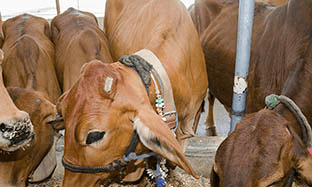.jpg)
How to fight against flies in cattle farms?
The impression of invasion is due to the short duration of the fly cycle, which can be reduced to one week when the conditions of temperature and humidity are optimal, and due to the number of eggs that a fly is able to lay. A fly that comes out of hibernation in the spring produces 1000 flies after only one week, which in turn will produce 1 million flies the following week.
By passing from one animal to another, flies can transmit many infectious diseases. The most common is probably the infectious keratoconjunctivitis Moraxella bovis: this disease is characterized by a high conjunctivitis which affects the cornea, leading to a loss of vision.
Wanting to eliminate flies in farms is illusory. However, we can significantly reduce their density, provided we take the right initiatives early enough in the season, and act on 3 levels:
-
The destruction of larvae in the nesting grounds
This is porbably the most important, and it must be done as early as possible, as soon as the first adult flies appear at the end of winter. All wet areas soiled with organic matter, including manure pits and manures, should be treated with larvicidal products.
-
The treatment of livestock premises
Population control begins with hygiene and ventilation in buildings, and then with the use of insecticides, sprayed on surfaces or disposed in the form of bait.
-
The elimination of flies on animals
Animal treatment complements this control plan, but by no means is it sufficient to control the fly population on its own. In all cases, this can only be considered through prescription of your vet. Do not hesitate to ask him for advice.

Cattle parasites: What are the peculiarities of external and internal parasites?
